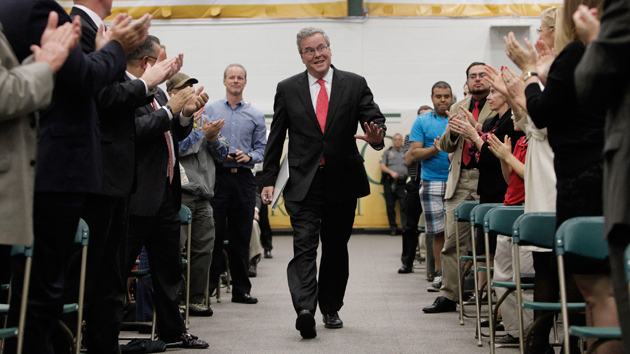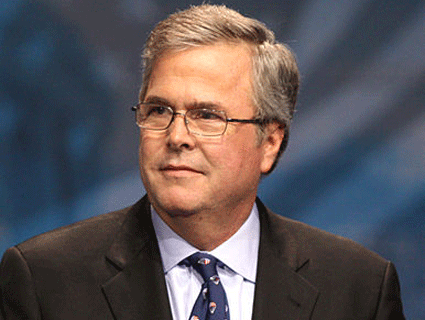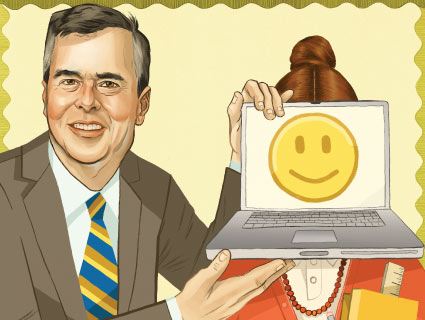
John Minchillo/AP
On December 16, former Florida Gov. Jeb Bush announced (via Facebook) that he plans to “actively explore the possibility of running” for president in 2016. It’s the first step toward formally entering the race.
But there are plenty of reasons why Bush should think long and hard before subjecting himself (and his family) to the ruthless scrutiny of a presidential campaign. His history is an opposition researcher’s dream—clouded by embarrassing family episodes, allegations of philandering, offensive comments to black voters, and dubious business dealings.
Many of these past deeds and misdeeds will no doubt be put under the microscope should Bush run in 2016. Here are 23 reasons why he might want to take a pass—and it’s only a partial list:
The shopaholic: Customs agents detained Bush’s wife, Columba, in 1999 at the Atlanta airport and fined her $4,100 for failing to declare the more than $19,000 in clothes and jewelry she’d purchased in Paris.
The addict: In 2002, Bush’s daughter Noelle was arrested for trying to purchase Xanax with a bogus prescription. In rehab, she was caught with a “white rock like substance” thought to be crack cocaine. Between 1995 and 2002, she racked up seven speeding tickets, five other traffic violations, and was involved in three wrecks.
The stalker: In 1994, Bush’s eldest son, George P., broke into his ex-girlfriend’s house. After fleeing her father, George returned to the scene and drove his SUV into their front lawn. His ex told the police that young George had “been a problem” since the breakup. Her father declined to press charges.
The other son: In 2000, cops discovered Bush’s 16-year-old son “Jebby” boffing a 17-year-old girl in a car in a mall parking lot. The police reported the incident of sexual misconduct, but Jebby wasn’t arrested.
The black sheep brother: Volumes have been written about Jeb’s siblings, especially former president George W. Bush. But his brother Neil, who helped bankrupt a savings and loan and once toured Asia with the late Rev. Sun Myung Moon while he was promoting the development of a 51-mile underwater highway between Russia and Alaska, will give reporters plenty to chew on.
The fraudster: In 1986, Camilo Padreda, who had been a counterintelligence officer for Cuban dictator Fulgencio Batista in the 1950s, hired Bush to find tenants for office buildings financed with US Department of Housing and Urban Development-backed loans. Bush took the gig, despite the fact that four years earlier Padreda had been indicted for embezzling $500,000 from a Texas savings and loan. Those charges were dropped, but in 1989 Padreda pleaded guilty to defrauding HUD of millions. (Bush was not involved in that scam, and it’s unclear whether he was aware of the savings and loan indictment when he teamed up with Padreda.)
The international fugitive: In 1986, Miguel Recarey, who’d done 30 days in jail for income tax evasion in the 1970s, paid Bush $75,000 to help him find a new headquarters for his health care company. The company never moved, but while Bush’s father was serving as vice president, Bush lobbied the US Department of Health and Human Services to help Recarey access millions in Medicare funds. Bush also helped arrange for Recarey’s company to provide free medical care to the Nicaraguan contras. Recarey was later indicted for a massive Medicare fraud scheme but fled the country before trial. He is now an international fugitive.
The bribery case: In 1988, Bush formed a company with GOP donor David Eller to market water pumps manufactured by Moving Water Industries, another Eller business, to foreign countries. The company used Bush’s White House ties to drum up business. In 1992, at the behest of MWI, the Export-Import Bank approved $74 million in US-backed loans to Nigeria to buy water pumps from Eller’s company. The Justice Department later alleged in a 2002 civil suit that about $28 million of those loans were used to bribe a Nigerian official. Bush was not implicated, but in November 2013, a jury found MWI guilty of making 58 false claims to the Export-Import Bank on its applications for the Nigerian loans. A federal judge fined the company $580,000. Bush escaped testifying after the judge determined his testimony wouldn’t be relevant to the central issue in the case.
The fortunate son: Cuban American real estate developer Armando Codina was the Florida chair of George H.W. Bush’s unsuccessful 1980 bid for the GOP presidential nomination. He loved the Bush family so much that when Jeb first moved to Miami in the early 1980s, he made Bush a partner in his real estate company and gave him 40 percent of the profits—even though Jeb had no real estate experience or money to invest. In 1985, Bush and Codina bought an office building partially financed by a savings and loan that later failed. The $4.56 million loan went into default, but federal regulators gave Bush and his partner a pass. Instead of foreclosing, they merely asked them to repay $500,000 of the loan. Taxpayers picked up the rest. In 1991, Bush and Codina sold the building for $8 million.
The shady company: In 2007, Bush joined the board of InnoVida, a building materials-manufacturing startup founded by a businessman whose previous company had gone bankrupt under suspicious circumstances. Bush and his fellow board members subsequently failed to notice that InnoVida officials had used forged documents to fake solvency, hidden the company’s financial problems, and misappropriated $40 million. The company’s Maserati-driving founder eventually went to jail for money laundering, and investors lost their shirts when the company went bankrupt in 2011. Last year, Bush agreed to repay the $270,000 he was paid by the company as a consultant to reimburse defrauded investors.
The Big Finance fail: Bush signed on as a paid adviser to the financial giant Lehman Brothers in 2007, just as the firm was on the brink of collapse. The company hoped he would use his political ties to rescue it, but he couldn’t even convince Mexican billionaire Carlos Slim to throw some money into that pit.
The terrorist: In 1989, Bush successfully lobbied his father, who was then serving as president, for the release of Cuban terrorist Orlando Bosch, who allegedly orchestrated the bombing of a Cuban airliner that killed 73 people in 1976 and other terrorist attacks. Bosch, who was in a federal prison on an immigration violation and dubbed an “unrepentant terrorist” by then-Attorney General Dick Thornburgh, was a cause célèbre for Miami’s influential Cuban population—a voting bloc that Jeb needed to launch his political career.
The black vote: During his first failed campaign for governor in 1994, Bush was asked in a debate what he would do to help African Americans. “Probably nothing,” he replied. In 2000, his administration purged 12,000 eligible voters from the rolls because they were incorrectly identified as convicted felons. More than 40 percent of them were African Americans.
The welfare wife: During his 1994 campaign, Bush said that women on welfare “should be able to get their life together and find a husband.”
The Playboy bunny: In 1999, Bush appointed Cynthia Henderson as his secretary of business regulation. Bush later transferred Henderson, who had worked her way through law school as a bunny at the St. Petersburg Playboy club, to another job in his administration, after she got caught taking a trip to the Kentucky Derby on a corporate jet owned by a company she regulated and accepting lodging and tickets to the event from an association of race track regulators. (Henderson’s boyfriend, a Florida real estate developer, eventually paid the cost of the trip.) Rumors that Henderson and Bush were having an affair forced him to publicly deny philandering.
The socialist: While at the elite prep school Andover, Bush was briefly a member of the socialist club. He also smoked pot.
The failed charter school: After wining just 4 percent of the black vote in his first failed run for governor, Bush teamed up with the Greater Miami Urban League to start Florida’s first charter school. In 1999, the state implemented a school grading system at Bush’s insistence. His own charter school received a D. By 2008, the school had earned a C- and was $1 million in debt; the state shut it down that year.
The shady charter school operator: In 2010, Bush gave the commencement speech for the Electronic Classroom of Tomorrow, an Ohio online charter school owned by William Lager, a big GOP donor who has served on Bush’s Digital Learning Council, which promotes for-profit online schools like ECOT. (Lager’s companies have also sponsored conferences hosted by Bush’s education foundation.) The school was far from a model for the future. At the time Bush gave his speech, ECOT’s graduation rate had never exceeded 40 percent. A 2001 state audit found that though the state had paid the school tuition for more than 2,000 students one month, only seven students had logged on to ECOT’s computer system. When state auditors couldn’t find the rest of the school’s alleged student body, ECOT was forced to repay Ohio $1.7 million. School founder William Lager’s private companies have earned more than $100 million from online schools that perform worse than any of Ohio’s worst brick-and-mortar public schools.
The cheaters: In 2010, Bush and his education reform organization, the Foundation for Excellence in Education, created a group of school superintendents and other high-ranking officials called “Chiefs for Change” to advance the Florida model of education, which emphasizes accountability and emphasized giving schools letter grades based on performance, especially standardized test scores. One of the original eight chiefs was accused of inflating the grade of a lackluster charter school funded by a Republican donor. The office of another was caught manipulating test score data.
The IRS complaint: In October, a New Mexico advocacy group filed a complaint with the IRS alleging that Bush’s Foundation for Excellence in Education failed to disclose thousands of dollars it paid to bring public school superintendents, education officials, and lawmakers to the group’s events, where they had private “VIP” meetings with the foundation’s for-profit ed-tech company sponsors. The complaint alleges that Bush’s foundation disguised travel payments as “scholarships” to hide the fact that the nonprofit was facilitating lobbying between big corporations and public officials. The IRS has not commented on the complaint. Bush’s foundation issued a statement dismissing the allegations as politically motivated.
The immigration book: Last year, Bush published Immigration Wars, a book that took a hardline position against a path to citizenship for illegal immigrants. After going on TV to push the book’s anti-path-to-citizenship position—and being accused of having changed his position to avoid offending the tea party—he quickly reverted to his previous stance of supporting citizenship.
The Reagan comment: In 2012, Bush said publicly that Ronald Reagan would have had trouble getting his party’s presidential nomination today—meaning that the tea party had driven the GOP too far too the right. He told editors at Bloomberg, “Back to my dad’s time and Ronald Reagan’s time—they got a lot of stuff done with a lot of bipartisan support.” Reagan “would be criticized for doing the things that he did.”
The mother: In April, former First Lady Barbara Bush appeared on the Today Show and said that her son would be “by far the best qualified man, but…we’ve had enough Bushes.”


















